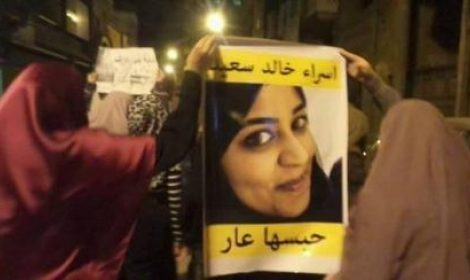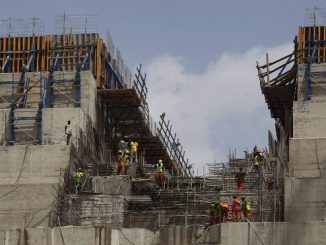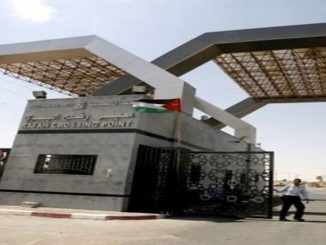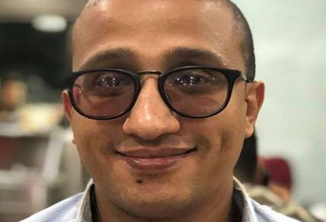
A group of Egyptian youth have organized – in coordination with students from different nationalities – a campaign that calls for the release of the student ‘Israa Khaled Saeed’.
A number of videos in more than 10 languages have been recorded to be sent to the European Union and international human rights organizations.
Israa’s arrest by the Egyptian security forces
On January 20, 2015, the Egyptian security forces stormed the house of Israa Khaled Saeed.
Israa, who was in her third year at the University of Engineering, was arrested and taken to Beni Suef security directorate amid insults from soldiers and informants.
The prosecution raised a number of charges against Israa, most notably the possession of RPG weapon, burning a police officer’s farm in Al-Wasta suburb, burning electrical transformers, as well as other charges that her lawyers could not imagine.
Then, Israa was transferred to El-Minya general prison to be the first political detainee in that prison.
In the prison, Israa was subjected to fatal violations starting from being lodged in a small cell as a grave where the the lights were off early. She was always assaulted by criminal prisoners. As a result, Israa went on an open hunger strike for bad treatment.
Moreover, al-Sisi’s regime didn’t only detain Israa but it also prevented her sick father -who was previously detained before she was arrested- from receiving necessary medical treatment until he died in the prison as a result of deliberate medical negligence.
In addition, Israa was also prevented from attending her father’s funeral.
She was also deprived of being informed of the death of her father in a human way.
At one of her court sessions, Israa received the news of her father’s death like a thunderbolt by one of the officers who told her with a smile on his face, “Go to salute your friends who came to console you in your father’s death”, which made her faint and lose her consciousness.
Since then, Israa has suffered from a deterioration in her health situation.
More than a year has passed after Israa Khaled was detained and her case was repeatedly postponed every time for months.
The last thing was written by Israa to her mother, “Mother, do you know? When you are leaving from the visit, I have the same feeling when I was detained from my home. These days I feel very tired, can hardly sleep, and I fall asleep, I wake up with more difficulty. The cell’s door is killing me. I stare at it all night and I cry till I sleep.”
Al-Sisi regime against humanity
Since Abdel Fattah al-Sisi led a military coup in 2013 against Egypt’s first democratically elected President Mohamed Morsi, the Egyptian authorities have engaged in one of the widest arrest campaigns in the country’s modern history, targeting a broad spectrum of political opponents.
According to Human Rights Watch and local rights groups,” Between June 2013 and May 2014, Egyptian authorities arrested or charged at least 41,000 people, and 26,000 more may have been arrested since the beginning of 2015.”
Detainees in Egypt’s prions suffer poor conditions and hundreds have died in detention as a result of torture and medical negligence.
It is worth mentioning that Amnesty International stated in its annual report of 2015-2016 that “The criminal justice system continued to serve as an instrument of state repression, with courts convicting hundreds of defendants on charges such as “terrorism”, “unauthorized protesting”, engaging in political violence and belonging to banned groups, after grossly unfair mass trials in which prosecutors did not establish the individual criminal responsibility of the defendants.”
It added that, “At least 3,000 civilians stood trial before unfair military courts on “terrorism” and other charges alleging political violence. Many, including leaders of the Muslim Brotherhood, were tried in mass trials. Military trials of civilians are fundamentally unfair.”



